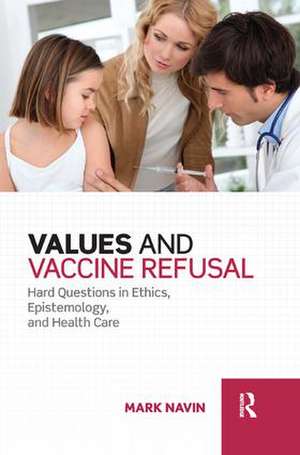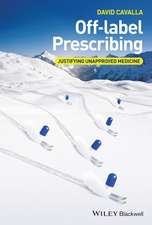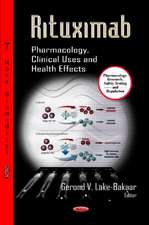Values and Vaccine Refusal: Hard Questions in Ethics, Epistemology, and Health Care
Autor Mark Navinen Limba Engleză Paperback – 12 ian 2018
| Toate formatele și edițiile | Preț | Express |
|---|---|---|
| Paperback (1) | 430.37 lei 6-8 săpt. | |
| Taylor & Francis – 12 ian 2018 | 430.37 lei 6-8 săpt. | |
| Hardback (1) | 1109.99 lei 6-8 săpt. | |
| Taylor & Francis – 7 oct 2015 | 1109.99 lei 6-8 săpt. |
Preț: 430.37 lei
Nou
Puncte Express: 646
Preț estimativ în valută:
82.36€ • 85.67$ • 67.99£
82.36€ • 85.67$ • 67.99£
Carte tipărită la comandă
Livrare economică 14-28 aprilie
Preluare comenzi: 021 569.72.76
Specificații
ISBN-13: 9781138478213
ISBN-10: 1138478210
Pagini: 240
Dimensiuni: 152 x 229 x 13 mm
Greutate: 0.32 kg
Ediția:1
Editura: Taylor & Francis
Colecția Routledge
Locul publicării:Oxford, United Kingdom
ISBN-10: 1138478210
Pagini: 240
Dimensiuni: 152 x 229 x 13 mm
Greutate: 0.32 kg
Ediția:1
Editura: Taylor & Francis
Colecția Routledge
Locul publicării:Oxford, United Kingdom
Cuprins
Preface, Acknowledgments, Introduction, Chapter One: Gender, Vaccine Denialism, and Resistant Epistemic Communities, Chapter Two: Bias and the ‘Irrationality’ of Vaccine Refusal, Chapter Three: Values and Vaccine Safety, Chapter Four: Parental Prerogatives and the Morality of Vaccination, Chapter Five: Coercive Vaccination, Chapter Six: Vaccine Exemptions, Conclusion
Recenzii
"Navin confronts the public stalemate over state-mandated childhood vaccines by taking seriously the concerns expressed by parents who worry about the safety and efficacy of vaccines. In so doing, he identifies the root of many parents’ concerns and exposes for us workable solutions that will help maintain high levels of public trust in vaccines."
Mark A. Largent, Michigan State University, USA
"Parents who deny the safety or efficacy of vaccines and refuse to vaccinate their children are the targets of deeply emotional debate. In a rigorous and fair-minded way, Navin explains how vaccine denialism is symptomatic of deeper issues about the relationship between the educated public and health care. Navin explains sympathetically how otherwise apparently reasonable people may reason poorly when they feel disempowered by experts and support one another in increasingly isolated communities of knowledge. Navin's understanding of what motivates vaccine denialists and how they fall prey to overconfidence and cognitive biases should be highly illuminating for those on all sides of the current vaccine controversy."
Leslie Francis, University of Utah, USA
“To sum things up, Navin’s book offers valuable insight into the diverse and thought-provoking reasons for vaccine denialism. His portrait of vaccine denialism is a useful tool for public health officials and scholars who want to better understand denialist communities and vaccine refusal more generally.”
Jessica Flanigan, University of Richmond, The Journal of Value Inquiry
"This book is the result of a rigorous research effort resulting in extensive notes and bibliographies at the end of each chapter. Navin is a philosopher, and there is a philosophical orientation to the written material.This can make the text challenging to read at times, but it enhances the quality of the information provided. Summing Up: Recommended."
R. L. Jones, Pennsylvania State University, College of Medicine, CHOICE
Mark A. Largent, Michigan State University, USA
"Parents who deny the safety or efficacy of vaccines and refuse to vaccinate their children are the targets of deeply emotional debate. In a rigorous and fair-minded way, Navin explains how vaccine denialism is symptomatic of deeper issues about the relationship between the educated public and health care. Navin explains sympathetically how otherwise apparently reasonable people may reason poorly when they feel disempowered by experts and support one another in increasingly isolated communities of knowledge. Navin's understanding of what motivates vaccine denialists and how they fall prey to overconfidence and cognitive biases should be highly illuminating for those on all sides of the current vaccine controversy."
Leslie Francis, University of Utah, USA
“To sum things up, Navin’s book offers valuable insight into the diverse and thought-provoking reasons for vaccine denialism. His portrait of vaccine denialism is a useful tool for public health officials and scholars who want to better understand denialist communities and vaccine refusal more generally.”
Jessica Flanigan, University of Richmond, The Journal of Value Inquiry
"This book is the result of a rigorous research effort resulting in extensive notes and bibliographies at the end of each chapter. Navin is a philosopher, and there is a philosophical orientation to the written material.This can make the text challenging to read at times, but it enhances the quality of the information provided. Summing Up: Recommended."
R. L. Jones, Pennsylvania State University, College of Medicine, CHOICE
Notă biografică
Mark Navin is Associate Professor of Philosophy at Oakland University (Rochester, MI). His research focuses on ethical issues in law and public policy. In addition to his work on vaccine refusal, he has published on topics including human rights, inequality, conscientious objection, international development assistance, social segregation, and food justice.
Descriere
Parents in the US and other societies are increasingly refusing to vaccinate their children, even though popular anti-vaccine myths – e.g. ‘vaccines cause autism’ – have been debunked. This book explains the epistemic and moral failures that lead some parents to refuse to vaccinate their children. First, some parents have good reasons not to defer to the expertise of physicians, and to rely instead upon their own judgments about how to care for their children. Unfortunately, epistemic self-reliance systematically distorts beliefs in areas of inquiry in which expertise is required (like vaccine immunology). Second, vaccine refusers and mainstream medical authorities are often committed to different values surrounding health and safety. For example, while vaccine advocates stress that vaccines have low rates of serious complications, vaccine refusers often resist vaccination because it is ‘unnatural’ and because they view vaccine-preventable diseases as a ‘natural’ part of childhood. Finally, parents who refuse vaccines rightly resist the utilitarian moral arguments – ‘for the greater good’ – that vaccine advocates sometimes make. Unfortunately, vaccine refusers also sometimes embrace a pernicious hyper-individualism that sanctions free-riding on herd immunity and that cultivates indifference to the interpersonal and social harms that unvaccinated persons may cause.









